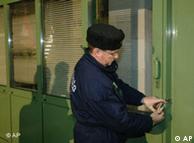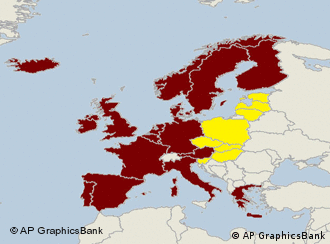Deutsche Welle | 04.01.2008

Police have closed up their border checkpoints
and started conducting patrols
Police say crime hasn't increased since Europe's visa-free area was expanded on Dec. 21, but illegal immigration has peaked. Many of those caught heading for Germany are Chechens with asylum status in Poland.
Concerns that bands of criminals from eastern Europe would stream into Germany after its eastern borders were lifted last month have proved unfounded.
Burglaries, thefts and traffic offences have been about the same since Dec. 21 as they were prior to the expansion to the visa-free Schengen zone, said police.
The stable crime rate likely has to do with increased police presence, said Brandenburg state police spokesman Peter Salender.
"It's like the 2006 soccer World Cup when there were hardly any cases of theft or assault simply because there were so many police around," he said.
While border checks have been removed, police are now conducting mobile patrols in the border regions as part of a new strategy.
Immigrants overwhelmingly from Chechnya
The effective removal of passport checks on Germany's eastern border has led to more people attempting to enter Germany illegally. A disproportionate number of those caught come from the war-torn Russian province of Chechnya and hold asylum papers that are valid in Poland but not in the rest of the Schengen area.

Nine countries joined the Schengen area of Dec. 21, 2007
"The majority of the cases -- 99 percent -- involve Russian nationals from Chechnya," Jacek Sonta from the Polish border guard told DW-WORLD.DE.
On Dec. 25, police stopped 18 Chechens traveling in Polish taxis on the motorway connecting Berlin with Stettin in Poland. They were deported to Poland, where they had legal residency. Another 10 would-be immigrants from Chechnya were apprehended on the same highway later in the week.
Dozens more have been caught in trains between Warsaw and Berlin and between the southern Polish region of Silesia and Vienna, Austria.
"Illegal immigration is a business that is almost entirely run by organized crime," Josef Scheuring, chairman of the GdP police union, told the Associated Press. His organization had protested lifting border controls. "The transit gangs are only beginning to feel out the possibilities."
Asylum status only valid in Poland
Currently, more than 7,000 Chechens have leave to remain in Poland and 1,782 received legal asylum status in 2007, according to a report by DPA news agency.
Formerly part of the Soviet Union, Chechnya declared independence in 1991. The Caucasian republic was torn apart by two wars with Russia in the 1990s, causing many Chechens to flee westward.
Sonta said that the Polish parliament, the Sejm, is currently redrafting its asylum and immigration laws to bring them in alignment with European Union requirements.
Poland joined the EU in 2004. It became part of the Schengen area on Dec. 21 along with seven other eastern European countries, bringing total membership to 24 states. The agreement abolishes border checks and allows for free movement between member states.
No comments:
Post a Comment